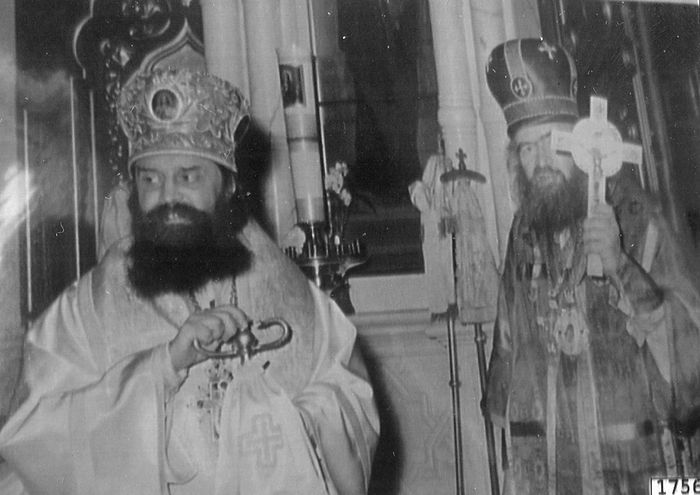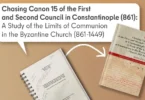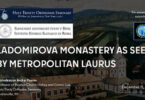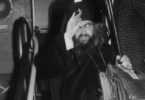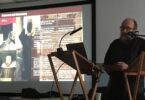Archbishop Anthony (Bartoshevich) of Western Europe (ROCOR) passed away in 1993.
On the feast of the Transfiguration, I wrote about the younger brother of Archbishop Anthony and his predecessor on the See of Geneva, Bishop Leontii (Bartoshevich), who passed away on that day in 1958.
His brother Andrei Bartoshevich was born in 1910 in Saint Petersburg into the family of a colonel of the Russian Imperial Army. Their father, Yurii Bartoshevich, left Russia with General Peter N. Wrangel’s Russian Army. His wife Kseniia, with two sons, joined him in Serbia in 1924.
Andrei studied at the Russian-Serbian gymnasium in Belgrade and, in 1939, graduated from the Theological Department of Belgrade University. There, St. Justin of Chelije and Prof. Sergei V. Troitskii influenced him – the former as a dogmatist and the latter as a canonist.
Andrei Bartoshevich painted icons, which was the origin of his interest in the Russian Old Believers. He painted an icon of the Descent into Hades (Harrowing of Hell) for the crypt of the Iveron Chapel in Belgrade, the sepulcher of Metropolitan Anthony (Khrapovitskii, d. 1936).
Andrei was close to the brethren of Milkovo Monastery. They had Russian brethren (monks), including St. John of Shanghai and several future ROCOR hierarchs. During the war, the brethren moved to Tuman Monastery, where Andrei was tonsured a monk along with his brother Lev in 1941.
On September 7, 1944, Metropolitan Anastassy appointed Archpriest John Sokal the head of all Russian clergy in Yugoslavia before he departed from Belgrade to the West. Later the same year, he was received into the Serbian Orthodox Church, which consequently rescinded its 1921 decision to provide canonical asylum to the Russian Church Abroad. Then, in response to an appeal to be received into the Moscow Patriarchate from the Serbian Church, Fr. John received Fr. Anthony (Bartoshevich) and other clergymen of the Russian Trinity Church in Belgrade “from the Karlovite schism”.
From 1945 until 1949, Fr. Anthony waited for permission to go to Russia. Although the Moscow Patriarchate elevated him to archimandrite, his documents never arrived. Thus, in 1949, he joined his brother in Geneva and was received back into the ROCOR. In 1958, after the sudden death of his brother, the bishop of Geneva, Archimandrite Anthony became a vicar bishop of St. John of Shanghai and San Francisco, who was Archbishop of Geneva.
Education, personal experience of Orthodoxy in Serbia, and the multiculturality of Orthodox Europe helped Archbishop Anthony to preserve a personal broadness while remaining loyal to the resolutions of the ROCOR Council of Bishops. While his vicar, Bishop Varnava (Prokofeff), performed the episcopal consecration of Bishop Lazar for the Catacomb Church in Russia in 1982, Archbishop Anthony wrote to Fr. Dmitry Dudko in 1979:
“[T]he free part of the Russian Church that exists abroad has never considered the Patriarchate of Moscow, officially recognized in the USSR, void of grace… In recent times we have been guided in our relationship with the Patriarchate by the opinion of the universally respected and venerated Archbishop John [of Shanghai], who said that of course the mysteries of the official Church in the USSR were valid; however, he maintained that the behavior of its leaders was unacceptable. We should try to avoid those bishops and their co-celebrants abroad. (…) At the same time we are accused by the Catacomb Church in Russia of not rejecting the sacraments of the Patriarchate of Moscow as void of grace.” (Cited from A. Psarev, “Looking Toward Unity: How the Russian Church Abroad Viewed the Patriarchate of Moscow, 1927-2007,” Historical Studies of the Russian Church Abroad.)
At the same time, Archbishop Anthony could prohibit a member of his Church with a Greek spouse from receiving communion in the Greek Church because this might scandalize “ecclesiastical refugees” who joined the ROCOR during Metropolitan Philaret’s tenure. Vladyka Anthony passed away in 1993. Less than ten years later, some clergy who claimed to be his disciples, having been scandalized about the ROCOR’s negotiations with the Moscow Patriarchate, left the Church Abroad.
Relevant Links:
Igor Troianov, “People Often Do Not Talk About What’s Important, but Rather about Their Grievances and Frustrations,” Historical Studies of the Russian Church Abroad.
“Guilford Parish Leaves Russian Church Abroad,” Historical Studies of the Russian Church Abroad.

